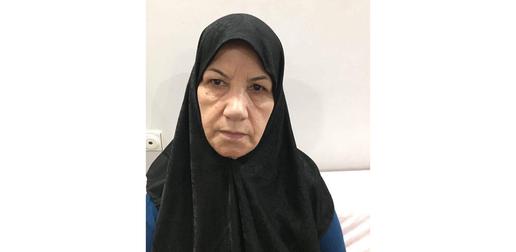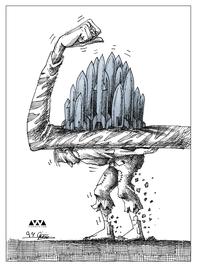Ahmad Reza Jalali, the disaster relief specialist currently facing the death penalty in Iran on espionage charges, will be tried in a Supreme Court hearing in Qom, though no date has been given for the trial.
The news comes amid reports that the scientist’s health has deteriorated and that authorities are denying him urgent medical care.
In response to his treatment by judicial and prison authorities — which includes being forced to confess, being held in solitary confinement and being denied access to a lawyer — Jalali has written to the head of the judiciary, Sadegh Larijani. In the letter, he sets out how he has “faced multiple illegal actions” and accuses the Ministry of Intelligence of creating a “fabricated crime” and instigating an “unfair and unjust trial and verdict" against him based on a forced confession and a manufactured testimony.
“They cut most of my own explanations and replaced it with a narrating voice who just said a list of lies, false accusations,” he said of the intelligence agents handling his case.
Jalali, who holds permanent residency in Sweden and has worked on disaster relief and research for over 17 years, was arrested in April 2016. He had traveled to Iran at the invitation of Tehran University.
"I Have Always Helped my Country"
His lengthy letter to Larijani — more than 1,900 words — provides details about the alleged information authorities used to manufacture a case against him. “In the past 20 months, I have numerously explained that I unintentionally made a mistake and trusted a person who introduced himself as a researcher from a disaster management company. He after revealed his real aim was looking for information about Iran, but my response to him was totally and clearly negative. Not only have I never done anything against my country, but instead have always helped my country from both scientific and technical aspects.” The person who approached him was thought to be working for a Western intelligence agency.
“Given the scale of intelligence collection I would be more surprised if a scientist from Iran working for a number of years on security matters was not approached by Western intelligence,” said Eugene Chudnovsky, Distinguished Professor at the Department of Physics and Astronomy at the City University of New York and co-chair of the board of the Committee of Concerned Scientists. “Ahmad Reza stopped talking to the person as soon as he realized that he was not a science researcher. Since Ahmad Reza did not possess a security clearance he could not reveal any classified information to that person even if he wanted to. He must have mentioned this to the Iranian interrogators to show his openness without anticipating that they would use any innocent piece of information to build a case against him.”
Chudnovsky also said that during the many years Jalali was working in Europe, Iranian military intelligence had also approached him trying to gain information about what he described as “European critical infrastructure.” He said Jalali’s refusal to cooperate with such request “ must have been the main reason for his arrest and imprisonment.”
In his letter to Larijani, Jalali also writes that he was not allowed legal counsel until he had been detained for more than six months. During that time he spent long periods in solitary confinement and was repeatedly told that if he confessed he would be released. He was threatened with “physical intimidation and harm [and] psychological torture," adding that the authorities had also threatened to harm his children.
Later, when lawyer Dabir Daryabeigi was assigned to represent Jalali, his family stated that the lawyer had undermined his client’s case and helped the judiciary and Judge Abolghasem Salavati, the judge presiding over his case in the Revolutionary Court, bring about a conviction.
He was convicted in October 2017 on charges of “collaborating with an enemy state” and accused of spying for Israel and handed down the death penalty. The appeal was upheld on December 8
Fabricated Links to Assassinations
Part of Jalali’s verdict accuses him of having something to do with the assassinations of nuclear scientists and Dr. Ali Mohammadi and Dr. Majid Shahriari, which Jalali dismisses as being “totally false and totally wrong.” He says the court refused to review documents that disprove the connection. “This is why I was not asked any questions about these events during the investigation and interrogation processes,” he writes. Iran has always insisted that Mossad agents killed the scientists, and the specific accusation of Jalali implicates what they think his role as a spy could have involved.
Jalali’s mother, Najibeh Mortazavi, has also written to Larijani, reiterating that the case against her son is “flawed and fraudulent.” She says that Judge Salavati issued his verdict despite there being 300 pages of documentary evidence in support of his innocence. “The Supreme Court also did not consider any documents submitted by the relevant branch and the verdict was confirmed by the two judges of the Supreme Court in two days.”
She also wrote of her son’s high academic and research qualifications and standards, adding that his work led to the “training of hundreds of students and the publication of dozens of books and scientific articles in the most prestigious international journals, which has promoted Iran’s scientific name and credibility. The accusation of such a committed patriot with these academic records and with hundreds of thousands of professors and scholars from all over the world is absurd,” she said.
In December 2017, scientists around the world called for Jalali's release.
In his letter, Jalali also appealed to judiciary chief Larijani to “remember the holy Koran says killing an innocent person is the same as killing all the people in the world.”
Sign the Scholars at Risk appeal to free Ahmad Reza Jalali
Read more about Jalali’s letter to Larijani
visit the accountability section
In this section of Iran Wire, you can contact the officials and launch your campaign for various problems


























comments